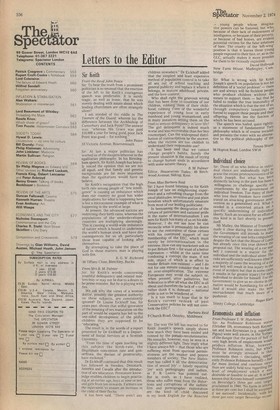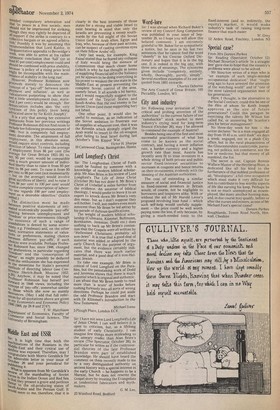Economists and inflation
From Professor T. W. Hutchison
Sir: As Professor Robinson states (October 19), economists both Keyne,, tan and non-Keynesian (e.g. espectallY Pigou) were well aware, in the 'forties' of the danger that the pursuit of 'full' or very high levels of employment would produce inflation. What, however, Professor Robinson omits, but Wh,_icht must be strongly stressed, is tna economists then — (including, aPtra ently Professor Robinson herself) — "far more limited and cautious vieWs than are widely held now regarding tit! level of employment which it wail desirable or feasible to aim at. It is We, known that Keynes himself commented on Beveridge's three per cent target proclaimed in 1944: 'No harm in aiming at three per cent but I shall be surprise if we succeed'. Incidentally, with his three per cent target Beveridge recora" Mended compulsory arbitration and that 'in peace in a free society, men should not be imprisoned for striking, though they may rightly be deprived of all support if the strike is contrary to a collective bargain or an agreed arbitration.' Possibly it was by assuming this recommendation that Lord Kaldor, in his quantitative appendix to Beveridge's work, was able to arrive at his rather optimistic conclusion that 'full' (or at least 97 per cent) employment could and should be combined with price stability, because 'a policy of a rising price level 'night be incompatible with the maintenance of stability in the long run'. However, Professor Robinson now proceeds sternly to denounce the 'concept of a "pay-off" between unemPloYment and inflation', as well as 'calculations purporting to show that just a little unemployment (say, statistical 3 per cent) would be enough.' Her oenunciation includes also 'the very cYnicism of this policy (now being advocated anew by Sir Keith Joseph).' It is a pity that among her extensive quotations from her previous writings Professor Robinson did not find room to include her following pronouncement of 1946: 'Nor is completely full employment desirable. The attainment of full ernPloyment, in this absolute sense, Would require strict controls, including direction of labour. To raise the average hif employment from 86 per cent (the average for Great Britain 1921-38) to, saY, 95 per cent, would be compatible With a much greater amount of individual liberty than to raise it from 95 per cent to 98 per cent. To raise it from 95 Per cent to 98 per cent (not momentarily but on the average) would involve great sacrifices of liberty, and to raise it front 98 per cent to 100 per cent would involve complete conscription of labour. 1'10 one regards 100 per cent employMent QS a desirable objective.' (Italics
added.)
I. The distinction must be made "etween positive statements of esti. Mated economically possible 'pay-offs' existing between unemployment and 'freedom or price-movements (though the existence of such a range of Possibilities is denied by some econoiTists, e.g. Friedman) and, on the other „and, normative statements of valuains or preferences, stating choices „etween different 'pay-offs', if such 'fioices were available. Perhaps Profestnr Robinson has, since 1946, changed :Pr preferences, in particular regarding i'reedoin' and the 'conscription cif .pbour', as might possibly be deduced on the enthusiasm she has expressed In the meantime for Stalin's personal Methods of directing labour (see Conference Sketch-Book, Moscow 1952, 1,k.28). Anyhow, it may be noted that clessor Robinson has herself put `"A'ard in 1946 views, including the ,..rhcent of 'pay-offs', somewhat similar those which she now so sternly 'enotinces. (May I add that full references for all quotations above are given 111,,,nlY Economists and Economic Policy 3-1966, pp 28-9 and 274?).
r. T. T. W. Hutchison
of Economics, Faculty of
0
rn. nierce and Social Science, The s'lliversity of Birmingham



































 Previous page
Previous page